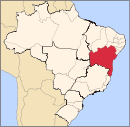Irecê
From Wikipedia, the free encyclopedia
| Irecê | ||
|---|---|---|
| Municipality and city | ||
| ||
 | ||
 Irecê | ||
| Coordinates: 11°18′14″S 42°51′21″W / 11.30389°S 42.85583°W | ||
| Country |
| |
| Region | Nordeste | |
| State | Bahia | |
| Mesoregion | Centro Norte Baiano | |
| Area | ||
| • Total | 121,118 sq mi (313,695 km2) | |
| Population (2012) | ||
| • Total | 62,527 | |
| Time zone | UTC -3 | |
Irecê is a small city in Bahia, Brazil. As of 2012 it had a population of 62,527 people. 476 kilometres (296 mi) by road northwest of Salvador. It is an agricultural town known for growing black beans and being a wine producing region.[1]
Notable landmarks
It is the home of the "Academia Ireceense de Letras e Artes." It was also the site the Universal Church of the Kingdom of God chose for an industrial kibbutz.[2]
References
- ↑ Mitchell, Simon (1 January 1981). The Logic of Poverty: The Case of the Brazilian Northeast. Routledge. p. 24. ISBN 978-0-7100-0637-0. Retrieved 12 June 2013.
- ↑ Meyer, Birgit; Moors, Annelies (1 December 2005). Religion, Media, and the Public Sphere. Indiana University Press. p. 65. ISBN 978-0-253-11172-2. Retrieved 12 June 2013.
External links
This article is issued from Wikipedia. The text is available under the Creative Commons Attribution/Share Alike; additional terms may apply for the media files.

